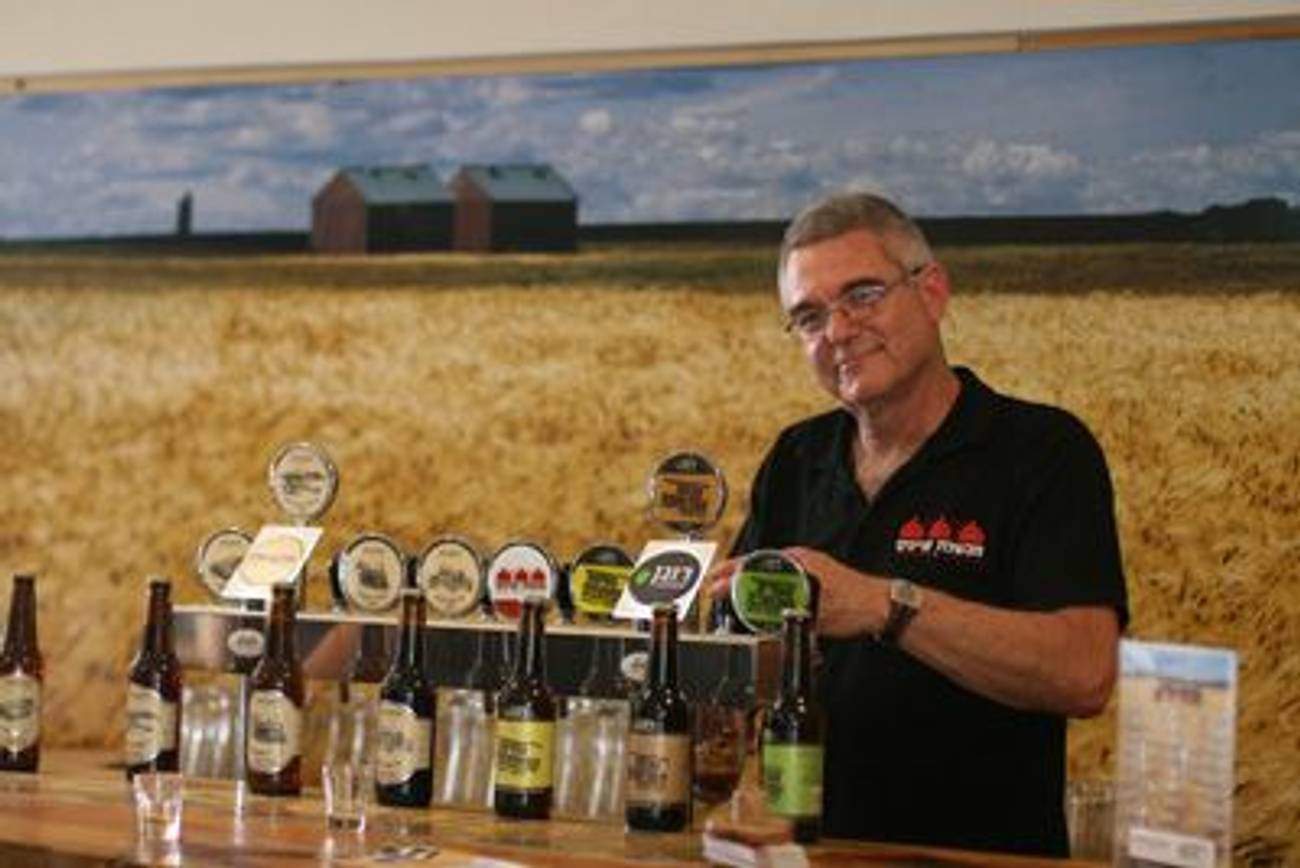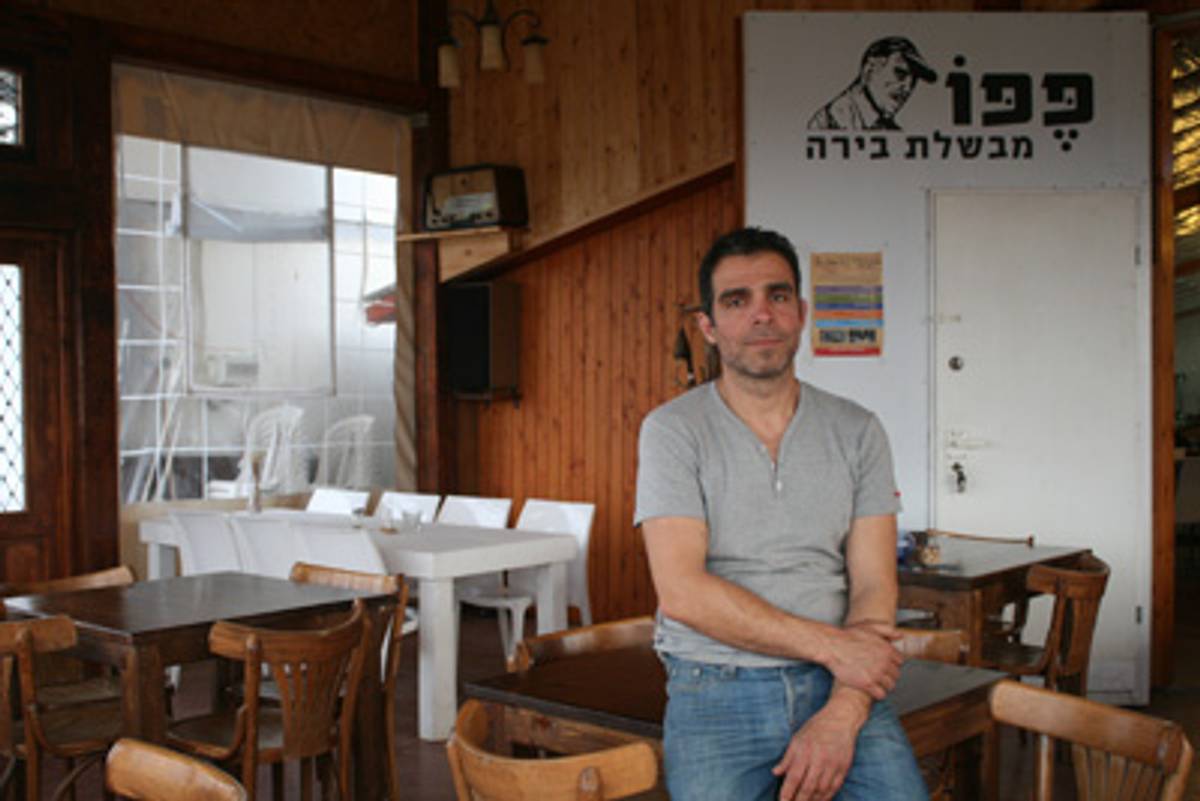Beer Breweries Boom in Israel, Despite High Taxes and Low Consumption
Craft-beer producers and home brewers hope to foster a domestic beer culture that mirrors Israel’s wine culture




With no sea in sight, one of the best counters to the broiling summer heat of the Jerusalem hills is a cold beer. Aram Dekel has perfected that antidote in the form of Touching Blade, an allspice beer with a bracing bite. He serves it in an airy, wood-framed restaurant surrounded by tall trees on the Zafririm moshav south of Beit Shemesh. Old pottery shards from the area prove that people have been crafting beer in the Holy Land for thousands of years. Dekel, with his long gray beard and a collection of fermenting honey, ginger, and banana liqueurs, looks like he could have been among those ancient brewers.
Dekel is part of a growing crop of craft-beer brewers in Israel. Ten years ago, the only domestic beer options in Israel were Goldstar and Maccabee lagers. Now, in the Mateh Yehudah region—the triangle between Jerusalem, the Ella Valley, and the far outskirts of Tel Aviv—nearly every farming community has at least one warehouse filled with beer fermenting in stainless-steel kettles. Inspired by cloudy German wheat beers or bitter American pale ales they tasted while traveling, Israeli brewers are importing sacks of grain and barley and creating local versions of their favorites. The new beers are finding a small but growing audience among discerning Israeli drinkers. But as the brewers try to foster an Israeli beer culture, they face two big hurdles: Israelis drink very little, and a pint of beer here is among the most expensive in the world.
Ori Saguy, the chairman of the Association of Small Brewers in Israel, says breweries are struggling to build a domestic beer culture despite these obstacles. “Twenty years ago in the States, there was Bud, Miller, Coors, and imports, and today every state has a number of craft breweries and amazing brewpubs,” Saguy said. “This is what I want in Israel—fantastic, fresh, and high-quality beer, and not just imports.”
Dekel, 52, runs a brewery called Abeer HaElla, meaning “Knight of the Ella” in Hebrew while also offering a play on the word “beer” in English. In addition to his allspice beer, he also makes honey-wheat beer and a chili porter, producing up to 200 liters a month in total. He started brewing as a hobby and gradually began to sell; anyone who wants to buy his brew has to drive the windy roads to his shop, where Dekel and his wife Bat Sheva make side dishes like beef chorizo sausage, pungent goat cheeses, and popcorn dusted in thyme and white pepper. He claims his beer is the most expensive in Israel, selling for as much as 37 shekels ($10.29) for a third-of-a-liter bottle—although it’s not as steep for the brewer himself. “Brewing is the best way to get beer for nothing,” Dekel said. “You can always say you’re just checking the beer, not drinking it.”
A 5-minute drive from Dekel, tables are full of young people sipping fresh beer on the balcony of the Srigim brewery, named for the moshav where it’s located. Ofer Ronen, 57, and Ohad Eilon, 51, worked in the Israeli high-tech industry for 30 years, and while they were traveling, they fell in love with beer. Ronen’s job as an electronics engineer, for instance, sent him to Stuttgart for six months: “When I went there, I immediately realized that beer is not a drink,” he said. “It’s a culture.” Later, while working in the United States, Ronen found a bottle of one of the first American craft beers, Pete’s Wicked Ale. Now he sells Ronen’s Wicked Dark Ale, a fruity beer made with roasted barley.
Srigim produces about 5,000 liters of beer a month, including four classics—Bavarian wheat, English blonde, Irish red, and a Belgian Tripel—and three more adventurous brews, including “Ugly Indian” IPA, a recipe Ronen cooked up. “When you smell it, you think you’re going to drink exotic sweet juice,” he said. “But when you drink it, you feel a real bitterness. And after that wears off, you taste pink grapefruit, lychee, and passion fruit.”
Although Ronen was inspired by German and American beers, a major difference when it comes to making beer in Israel is price. German supermarkets sell pints for less than a euro, and bars charge two or three euros for a pour. In Israel, the price is doubled or even tripled, reflecting high taxes, a tiny market, and the need to import all the raw ingredients. Tax on beer in Israel doubled in April and is now about $1.20 a liter.
Ronen says he is dealing with the higher taxes by raising his prices and by trying to export to the United States. Last month, he sent his first pallet of beer to a Washington, D.C., event sponsored by the Jewish Federation of Greater Washington, where it sold out.
Shahar Hertz, who sells brewing equipment and specialty beers at his Beer and Beyond store in Tel Aviv, says Israeli beer prices are among the 10 highest in the world, and the tax on beer is among the five highest. Moreover, the market is small: Israelis drink about 14 liters of beer on average, Hertz said—one-tenth of the Czech average, and far below the American average of 78 liters a year. But the brewing community continues to grow. Nationwide, there are about 15 licensed craft brewers. Hertz says there are hundreds of home brewers, and a few dozen of those sell their beer without approval from Israel’s health ministry. Hertz is running a brewing competition over the summer; he expects 100 hobby brewers will enter. He is also leading a summer beer tour to Belgium.
The giant of the Ella Valley is the Shapiro Brewery, in the industrial section of Beit Shemesh. Shapiro has billed itself as “the first Jerusalem Beer,” because its brewers, two brothers, started experimenting with malted barley in a Jerusalem backyard. Now they make about 9,000 liters a month.
When I visited, brew-master Yochai Kotler, 34, rushed me through a tour. It was late Friday afternoon, and Shapiro fastidiously keeps the Sabbath to appeal to Jerusalem’s observant drinkers. Kotler studied brewing in the United States and Germany. He makes a Bavarian-style wheat, an American-style pale ale, and an oatmeal stout. The beer, known as much for its flavor as for its promotional videos, has become a fixture in Jerusalem’s bars and restaurants.
A short detour northwest of Beit Shemesh, in the Tzora kibbutz, Leon Solomon, 67, began brewing beer after he retired as a chef. He makes a gluten-free sorghum beer he remembers from growing up in South Africa, along with a Belgian Tripel, wheat beer, and alcoholic cider. Solomon serves them all in his Samson Brewery.
Finally, on the Zelafon moshav west of Jerusalem, Moti Bohadana, 44, welcomes visitors late into Friday afternoon. Bohadana moved here from the north to make a winery. Along the way he experimented with brewing beer and eventually decided to go commercial. Now he makes 1,000 liters a month. He named the brewery Pepo after his father, a restoration carpenter who transformed an old chicken coop into a brewery and tasting hall. Bohadana, a sign-maker by training, welded the stainless-steel equipment. He makes eight beers, each named for the women in his life: Golda is a delicate Scottish ale, named for Bohadana’s mother-in-law. Alma is an airy blonde wheat beer, named for Bohadana’s daughter. “The IPA is named for my grandmother Elisheva, who was born and died in Jerusalem,” he said. “You know how some people had a tough life in Jerusalem, in the Ottoman times? How they would count everything and store things under the bed? She was the same. And her IPA is a hard beer, bitter, but there is a lot of flavor.”

The mushrooming beer industry is supporting a growing number of festivals. Jerusalem will hold its ninth annual beer festival in early August. The Mateh Yehuda Regional Council will hold its festival late August. Other beer events are scattered through the year.
Bohadana, of the Pepo brewery, said Israelis like light beers with a high alcohol content—a counter to the hot summer days. He sees a beer culture slowly fermenting in Israel. “Twenty years ago, people here didn’t know anything about the wine,” he said. “The grapes grew and grew, and people started tasting nice things. The same is happening with beer. Every year we see new people interested in tasting our beer. In five years, you will see a change.”
Daniella Cheslow is an American journalist covering the Middle East.